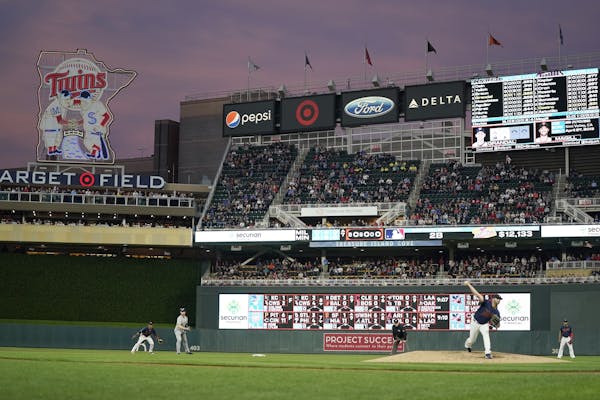For a guy who is so unpredictable on the field, a player who could run the bases backward and convince you it's another clever gambit, Eddie Rosario sure is … disciplined. Regimented. Even monotonous.
"Eddie plays with his hair on fire," Twins hitting coach James Rowson said. "But he's practically religious about his routine. You never know what he's going to do during the game, but you always know, practically to the minute, what he's doing before it."
Rosario is hitting, and hitting some more, running through a carefully honed series of drills with assistant hitting coach Rudy Hernandez in the batting cage every day, which helps explain how a skinny 27-year-old Puerto Rican currently is tied for the most home runs in an American League full of Bunyanesque sluggers.
But hitting has always been Rosario's passion. Fielding came second, more of an occasionally entertaining duty, something to amuse him between at-bats. He loved making sliding catches in left field, which became such a signature that they were immortalized in a unique bobblehead last summer.
Now, though, he has applied the same disciplined approach to preventing runs as to producing them.
"It's working hard. It's learning the field and making throws, so you know you can do it when important plays happen," Rosario said. "It helps the team, and that's what I want to do."
On the Twins' six-game road trip which ended Wednesday, Rosario's four home runs helped plenty, but he also wiped out three runners on the bases, robbed a home run, and forced an Orioles pinch-runner, en route to tying Sunday's game in the ninth, to slam on the brakes and stop at third base. The hitting is great, in other words, but Twins pitchers probably appreciate the run-stopping defense even more.
"It's such a pick-me-up when that happens," Kyle Gibson said of those reversible runs. "It's like when a guy saves a home run — you're feeling bad about giving up a run, and all of a sudden, it's gone and you've added an out. It's great."
"He's obviously swinging the bat very well, but as important, we can mention that his defensive contributions have been exceptional," said Twins manager Rocco Baldelli. "He's made plays to win games for us — literally win games for us in the outfield. He's ever-improving, and he wants to be great. So he's willing to work."
It's for those moments that Rosario and outfield coach Tommy Watkins set aside time twice a week to regularly refresh his defense. Watkins hits fly balls off the wall so Rosario can practice tracking ricochets off the different angles. The left fielder also spends far more time these days, he said, practicing throwing from the outfield, with a two-word goal: "Less errors."
Outfield errors are most frequently the result of throws that sail wide or skip away from their target, allowing baserunners to move up. Rosario made it clear he wants to reduce his total of nine errors a year ago, a number that led all major-league outfielders and neutralized his nine outfield assists.
"I move quick when I see the ball. I am an aggressive guy," Rosario said of his defense. "Sometimes when I throw, it's too hard. I need to see where I'm throwing, and throw fast. But not as hard as I can, because it has to go where I want."
"He's doing a good job of staying under control, not trying to be Superman and throw from the wall all the way to the plate," said Watkins, in his first season as the Twins' outfield coach.
"It's about being efficient. Keep the ball down, give the infielders a chance to react to the ball. You want to get the runner, but it's important to not throw it away too, and cost yourself more bases."
Funny thing is, as accomplished as Rosario is becoming in the outfield, he kind of misses the infield, and he still takes ground balls there, just in case. The Twins turned him into a second baseman in 2013 and 2014, figuring his path might be blocked by other outfielders. Then Brian Dozier emerged in Minnesota, and the moved him back to his original spot in the outfield.
Was he disappointed to move?
"A little bit. I liked the infield," Rosario said. "But [the Twins] told me if I don't play that, I might not go to the big leagues. It was my chance. … It's good now."


![Minnesota Twins pitcher Jhoan Duran (59) in the ninth inning Tuesday, August 15, 2023, Target Field in Minneapolis, Minn. ] CARLOS GONZALEZ • carlos](https://arc.stimg.co/startribunemedia/NWLT5CNXGTRZA6KVTMIPSOG3KI.jpg?w=75&h=75&fit=crop&crop=faces)

